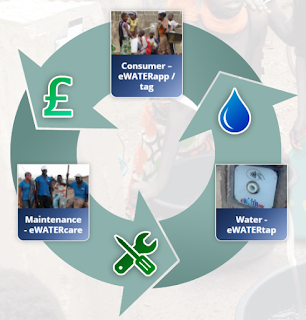Women, water management and climate change
Climate change is a global problem;
however, it effects some people more than others, climate change is expected to
increase the frequency and magnitude of these events. In particular it impacts
developing countries, and the vulnerable within them. Many of the effects of climate
change which they receive includes water based problems, as much if Africa receives
droughts and flooding. These difficulties have dire consequences for those who
are socially and economically vulnerable, this often includes women. Women face
the brunt of these occasions not only because of social and economic factors
but because of their geographic location. These extreme weathers have killed more women
than men and this is often due to the socio-economic status of the women. In
this blog, I will be exploring the ways in which women in Africa are subject to
a harsher climate change than men, and the reasons for this occurrence.
According to the IPCC (Intergovernmental Panel on Climate Change) South Africa, Mozambique and Kenya all suffer from vulnerability to climate change in regard to water in social, political and ecological significance.
In many rural African households,
the women are the managers and collectors of the natural resources, which their
family use daily. Often women must travel far distances, often experiencing
health problems as a result, in order to obtain water from the public source.
With extreme weather circumstances as a result of climate change, this is
directly impacting the women who have to travel long, as well as short distances
for their water. If they are experiencing a drought, the women are often forced
to travel longer distances to obtain the water. This can not only lead to health
issues, but is often dangerous, as there are gangs which control some water
sources. Similar outcomes occur when the extreme weather changes they are
experiencing is flooding. As erosion and perodic flooding can lead to salt water
intrusion, thus contaminating the drinking water, forcing the women to collect
water from elsewhere. The increasing frequency and magnitude of these extreme
weather events are negatively impacting women’s everyday tasks, the United
Nations predict that two-thirds of arable land in Africa will disappear by
2025.
Although women’s daily lives are more
impacted than men’s’ lives they often have none too little say about the decision
making in regard to climate change proposals for adaptation. These decisions are
often made at a community level, they usually only include the heads of the community
which are men. It would be extremely beneficial if women were included in these
talks and decisions as they have first-hand experience of the problems and not
only how they need to be solved but which should be priority over others. Women
possess local social and ecological knowledge, which they have attained through
the years of their traditional gender roles. This community education and
organisation should be used and exploited in order to live through climate
change and what it brings.
This bottom-up approach will
enable the community to work together, and value the opinions and problems of
women. They will be able to use the local knowledge to evaluate their
vulnerabilities to climate change and develop solutions through democratic
participation. The communities can learn from other groups who have had similar
experiences with extreme weather and how they have handled the situations they
were in.
Overall, it is clear that climate
change regularly has fatal circumstances, especially to women. Not only can
these events prove to be fatal to women but if not, are disruptive to their
daily lives and tasks. For example, if they experience flooding or drought they
could be forced to travel further in order to collect water for their families,
often putting them in dangerous situations. Over years or carrying out these
tasks and living in environmentally dangerous places women have developed much
knowledge on the ecosystem and how the extreme weather events disrupt it. This
knowledge could be highly beneficial to bottom-up approaches which aim to
tackle water management during climate change. At the moment, many women are
not consulted when these decisions are being made, this will need to be changed
if communities want to survive these events.
References
Anisfeld, S.C., 2010. Water
Resources. Island Press, Washington, DC.
Meyer, W.B., Butzer, K.W., Downing, T.E., Turner II, B.L., Wenzel,
G.W., Wescoat, J.L., 1998. Reasoning by analogy. In: Rayner, S., Malone, E.L.
(Eds.), Human Choice and Climate Change. The Tools for Policy Analysis, vol. 3.
Battelle Press, Washington, D.C, p. 217-289.
Mirza, M.M.Q., 2003. Climate change and extreme weather events: can
developing countries adapt? Climate Policy 3 (3), p.233-248.
Moraes, A., Perkins, P.E., 2009. Etica, Genero e Classe Social na
Politíca Participativa de Agua. In: Gislene Aparecida dos Santos (Ed.), Etica,
Pesquisa e Políticas Publicas. Editora Rubio, São Paulo, Brazil, p. 107-122.
Neumayer, E., Plümper, T., September 2007. Catastrophic events on the
gender gap in life expectancy, 1981-2002. Annals of the Association of American
Geographers 97 (3), p.551-566.

This comment has been removed by the author.
ReplyDeleteReally interesting post here - it's given me a lot to think about! With regards to water sources, do you think that there could be increasing emphasis upon the utilisation of groundwater as a source compared to collecting water from surface water sources such as rivers, which could be more prone to rising temperatures? Thanks!
DeleteHi!
ReplyDeleteThanks for the explanatory article! It was a good introduction for me into the topic. As we have talked a lot about how a lot of factors affect the situation of people I was wondering if genital mutilation plays a role in the topic of gender and water?
Best, Dana